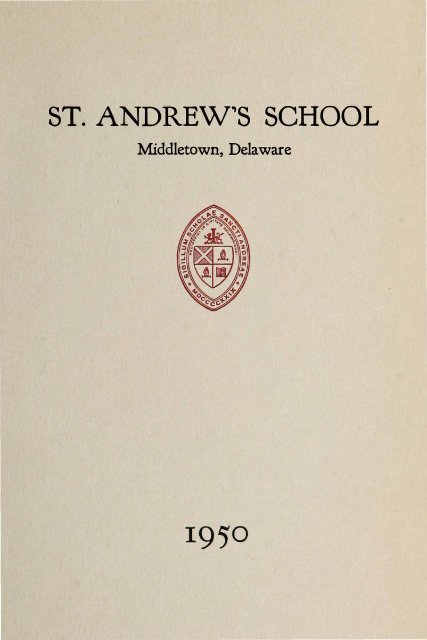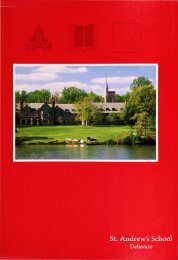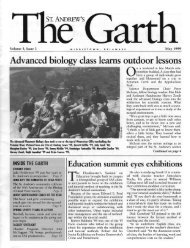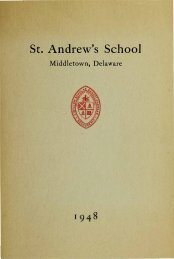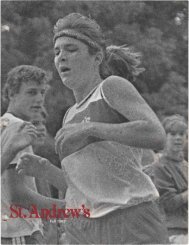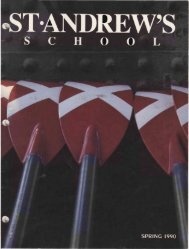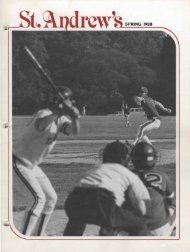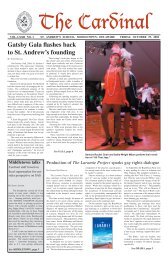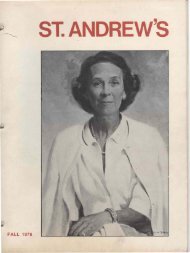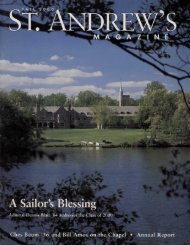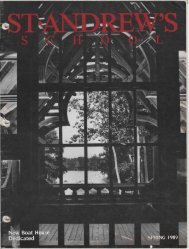ST. ANDREW,S SCHOOL - Saint Andrew's School Archive
ST. ANDREW,S SCHOOL - Saint Andrew's School Archive
ST. ANDREW,S SCHOOL - Saint Andrew's School Archive
You also want an ePaper? Increase the reach of your titles
YUMPU automatically turns print PDFs into web optimized ePapers that Google loves.
<strong>ST</strong>. <strong>ANDREW</strong>,S <strong>SCHOOL</strong><br />
Middletown, Delaware<br />
I
CALENDAR<br />
1950<br />
WINTER TERM BEGINS ............................ Thursday, January 5<br />
Ash Wednesday ···---·--·-···············---··········-·- Wednesday, February 22<br />
Winter Term Examinations -----------··············---·· Saturday, March 18<br />
through Thursday, March 23<br />
Spring Vacation begins ····················---------------- Thursday, March 23<br />
Good day ................................................................ day, prill :7<br />
astei" ][)ay ····-······-----····················-········-··········------···· Sunday, pr1Ll <br />
SPRING TERM BEGINS .................................. Monday, pril 10<br />
Entrance Examinations --------------------------·------------- Saturday, pl 2<br />
Firlal xaminations .................................................... day, June 2<br />
through Thursday, June 8<br />
Commencement ···························-···············--------- Saturday, June 10<br />
LL TERM BEGINS --------------·--······· Wednesday, September 20<br />
Thanksgiving Weekend begins .............. Wednesday, November 22<br />
Thanksgiving Weekend ends ······------------------ Sunday, November 26<br />
St. ndrew's ][)ay ·--------------------------------------- Thursday, November 30<br />
all Term xaminations -----------------------------· Saturday, ][)ecember <br />
through Thursday, ][)ecember 14<br />
Christmas Vacation begins --------------·········· Thursday, ][)ecember 14<br />
1951<br />
WINTER TERM BEG INS -------------------------- Thursday, January 4<br />
sh Wednesday ............................................ Wednesday, February 7<br />
Winter Term xaminations .............................. Saturday, March 17<br />
through Thursday, March 22<br />
Spring Vacation begins .................................... Thursday, March 22<br />
Good Fday .......................................................... riday, March 23<br />
Sunday, March 25<br />
aster ------------···························-----------------------------<br />
SPRING TERM BEGINS ··---------------·-··------------- Thursday, pril 5<br />
Entrance Examinations ........................................ Saturday, pl 28<br />
Final Examinations ...................................................... Fday, June 1<br />
through Thursday, June :7<br />
Commencement ------------------------------------------------------ Saturday, June
St. Andre"\V's <strong>School</strong><br />
MIDDLETOWN, DELAWARE<br />
FOUNDED 1929<br />
BY<br />
THE EPISCOPAL CHURCH ScHooL FouNDATION, INc.
TRU<strong>ST</strong>EES OF<br />
THE EPISCOPAL CHURCH <strong>SCHOOL</strong><br />
FOUNDATION, INc.<br />
THE RIGHT REvEREND ARTHUR R. McKIN<strong>ST</strong>RY, D.D.<br />
Bishop of Delaware<br />
President<br />
J. THOMPsoN BRoWN, EsQ.<br />
Vice-President<br />
ALLAN J. HENRY, EsQ.<br />
Secretary and Treasurer<br />
HoNORABLE RicHARD S. RooNEY<br />
THOMAS F. CADWALADER, EsQ.<br />
EMILE F. ou PoNT, EsQ.<br />
H. BELIN ou PoNT, EsQ.<br />
WALTER J. LAIRD, EsQ.<br />
ALBERT NALLE, EsQ.<br />
WILLIAM S. PoTTER, EsQ.
FACULTY<br />
Headmaster<br />
THE REVEREND WALDEN PELL, II, M.A., OxoN, S.T.D., U. OF PA.<br />
St. Mark's <strong>School</strong>, Princeton,<br />
Christ Church, Oxford<br />
Assistant Headmaster<br />
Sacred Studies<br />
JoHN N. MAciNNEs, B.S.<br />
Germantown High <strong>School</strong>, Trinity College,<br />
Columbia University<br />
Mathematics<br />
Senior Master<br />
WILLIAM H. CAMERON, Jn., M.A.<br />
Episcopal High <strong>School</strong>, Pennsylvania State<br />
College, Columbia University<br />
English<br />
Remedial Reading<br />
Mater<br />
WILLIAM H. AMOS, A.B.<br />
American <strong>School</strong>, Tokyo; Rutgers University,<br />
University of Colorado, Columbia University<br />
RICHARD L. BARRON, B.M., A.C.<br />
Ross High <strong>School</strong>, Freemont, 0.,<br />
Oberlin Conservatory, Curtis Institute<br />
CHE<strong>ST</strong>ER EARLE BAUM, JR., A.M. IN T.<br />
St. <strong>Andrew's</strong> <strong>School</strong>, Haverford College,<br />
Harvard University<br />
GEORGE ADAMSON BROADBENT, A.B.<br />
St. <strong>Andrew's</strong> <strong>School</strong>, Princeton University<br />
JoHN A. CAMPBELL, M.A.<br />
Elmira Free Academy, Colgate University,<br />
Cornell University<br />
Biology<br />
General Science<br />
Zoology<br />
Music<br />
Manual Training<br />
English<br />
Remedial Reading<br />
How to Study<br />
History<br />
Latin<br />
Librarian<br />
Audio-Visual<br />
Program<br />
RALPH v. CHAMBLIN, JR., B.S.<br />
Episcopal High <strong>School</strong>, University of Virginia,<br />
George Washington University<br />
w. LEWIS FLEMING, M.A.<br />
Richmond Academy, Hampden-Sidney College,<br />
University of Virginia, George Washington University,<br />
Columbia University, The Sorbonne<br />
French<br />
German<br />
French<br />
Spanish<br />
4
FACULTY -Continued<br />
RICHARD HARCOURT HAGERTY_, M.A.<br />
Tome <strong>School</strong>, U. S. Naval Academy, Rollins College,<br />
University of Virginia, Boston University<br />
THE REvEREND EDWARD WALLACE HAWKINS_, M.A.<br />
Donaldson <strong>School</strong>, St. Stephen's College,<br />
Columbia University, University of Pennsylvania<br />
F. RICHARDSON HILLIER, M.S.<br />
Virginia Episcopal <strong>School</strong>, Davidson College,<br />
University of Virginia<br />
BLACKBURN HuGHEs, JR._, B.A.<br />
Kent <strong>School</strong>, Princeton University<br />
University of the South<br />
HowARD E. C. ScHMOLZE, B.S.<br />
Newtown High <strong>School</strong>, N. Y. C., Trinity College,<br />
Columbia University<br />
CoRTLANDT ScHOONOVER_, A.B.<br />
Tower Hill <strong>School</strong>, Wesleyan University<br />
JAMES R. TEN BROECK, A.B.<br />
Woodberry Forest <strong>School</strong>, Harvard University,<br />
Bowling Green State University, Princeton<br />
GARRET CoERTE VooRHEEs, M.A.<br />
Chemistry<br />
Physics<br />
Mathematics<br />
History<br />
English<br />
French<br />
Mathematics<br />
Secretary to<br />
the Faculty<br />
Mathematics<br />
Geography<br />
History<br />
Latin<br />
Kent <strong>School</strong>, Princeton University, University<br />
of Pennsylvania, University of North Carolina,<br />
Linguistic Institute<br />
Associate Teachers<br />
THE REVEREND KENNETH E. CLARKE_, B.A., B.D.<br />
Wilmington Friends <strong>School</strong>, Bucknell University,<br />
University of the South, <strong>School</strong> of Theology<br />
of the University of the South<br />
THE REVEREND ERNE<strong>ST</strong> MERTON HoYT, A.B., S.T.B.<br />
Glens Falls High <strong>School</strong>, N. Y.,<br />
Hobart College, St. Lawrence University,<br />
General Theological Seminary<br />
Sacred Studies<br />
Sacred Studies<br />
History<br />
J. CRAIK MoRRis., JR.<br />
Episcopal High <strong>School</strong>, University of the South,<br />
Industrial Art Academy, Philadelphia,<br />
Wilmington Art Academy<br />
English<br />
Art<br />
5
To P\UUOt:lPHIA<br />
Nt:W Jf:RS['f<br />
6
PROPERTY<br />
The <strong>School</strong> buildings are located on a point overlooking Noxontown<br />
Pond, two miles from the center of Middletown, twenty-five<br />
miles south of Wilmington, and about sixty miles from Philadelphia.<br />
The surrounding country is rich farm land, of many historic associations<br />
with Colonial Delaware and Revolutionary times.<br />
The main building, a modern fireproof unit, provides complete<br />
accommodations for a hundred and seventeen boys. The younger<br />
boys sleep in cubicles in open dormitories, the older boys in double<br />
rooms. There are also the Headmaster's House, eight masters'<br />
houses, a three-family annex, the Gymnasium, two boat houses, a<br />
Laundry Building, and a Maintenance Building. The Gymnasium<br />
houses a large basketball floor, a wrestling room, four squash 'courts,<br />
a rowing machine room, four small dormitories housing approximately<br />
thirty boys, and locker and shower accommodations for the<br />
whole <strong>School</strong>.<br />
The property comprises three hundred and fifty acres, most of<br />
which is under cultivation. On one edge the property is bounded<br />
by Noxon town Pond,. which is. two miles long, and on. another by<br />
Silver Lake, three-quarters of a mile in length. The entire property<br />
is posted as a sanctuary for birds, animals, and plants.<br />
On the <strong>School</strong> grounds are five football fields, three separate<br />
baseball diamonds, and six tennis courts. The <strong>School</strong> has its own<br />
piers on Noxontown Pond. The waters of this lake are well known<br />
fishing grounds and provide good swimming and sailing. They are<br />
suited to rowing, which has been conducted on an organized scale<br />
since 1932.<br />
Besides the <strong>School</strong> plant there is the Farm, operated by the<br />
<strong>School</strong> as a separate unit. It includes a large farm house, a modem<br />
cow bam and horse stable, and numerous farm buildings.<br />
With its herd and stables, and nearly three hundred acres available<br />
for cultivation, the Farm contributes largely to the <strong>School</strong> in food<br />
and has facilities for horseback riding.<br />
7
Purpose<br />
As stated by the founder, the late Alexis Felix du Pont, the purpose<br />
of St. <strong>Andrew's</strong> <strong>School</strong> is to provide secondary education<br />
of a definitely Christian character, at the minimum cost consistent<br />
with modern equipment and the highest standards. The teaching<br />
and conduct of the <strong>School</strong> are based on the Christian religion.<br />
All boys are expected to take part in the <strong>School</strong>'s worship and<br />
religious education, which are in accordance with the practice<br />
and principles of the Protestant Episcopal Church; but<br />
membership in another religious body will not<br />
exclude an applicant from admission.<br />
8
CHAPEL<br />
A boy entering the <strong>School</strong> becomes a member of a community<br />
living according to the general pattern of a Christian family. Its<br />
ideal of conduct is mutual trust and love, simplicity of life, and<br />
the sharing of responsibilities and opportunities. This idea is<br />
expressed and nurtured by the <strong>School</strong>'s religious life, which centres<br />
in the Chapel.<br />
In the Chapel, which is a large room in the Main Building with<br />
pew accommodations for over two hundred, a short service is held<br />
every evening, Monday through Friday. On Sundays and Holy<br />
Days there is an early celebration of Holy Communion, and on<br />
Sundays, except the first Sunday of each month, a late Service of<br />
Morning Prayer and sermon. The <strong>School</strong> is in the Parish of St.<br />
Anne's, Middletown, founded 1705, of which the Rev. Kenneth<br />
Clarke is rector.<br />
The Vestry of the Chapel is elected from among the boys, and<br />
acts as the representative council of the student body. There are<br />
also a student Choir, Altar Guild, Acolytes' Guild, and Sunday<br />
<strong>School</strong> for faculty children. Members of the Sixth Form read the<br />
lessons at Evening Prayer. The ladies of the <strong>School</strong> community<br />
maintain an active branch of the Woman's Auxiliary.<br />
St. <strong>Andrew's</strong> is the Diocesan <strong>School</strong> of the Diocese of Delaware.<br />
In addition to the regular Sacred Studies classes, special instruction<br />
for Confirmation is given to those desiring it. The Bishop of<br />
Delaware visits the <strong>School</strong> in the winter for Confirmation, but boys<br />
expecting to be confirmed in their home churches will gladly be<br />
given preparation at <strong>School</strong> if their parents and rectors so request.<br />
9
HEALTH<br />
On the third floor of the main building are a large Ifirmary,<br />
an office, and the quarters for the resident nurses. There is no<br />
Infirmary charge but each boy will be charged an actual cost fee<br />
for materials or medicines used.<br />
It is imperative that each new boy present a <strong>School</strong> Medical .<br />
Certificate filled out by his private physician in conjunction with<br />
his parents or guardian before entering the school. The visiting<br />
physician in charge is Dr. Walter E. Lee of Middletown, whose<br />
office is equipped with x-ray, cardiograph, fluoroscope, laboratory,<br />
and other modern equipment. Wihnington hospitals and specialists<br />
are accessible if needed. The Head Nurse, with her assistant,<br />
attempts to keep all boys at the highest possible health level. A<br />
vigilant watch is kept on the health of each boy, the object being<br />
prevention of illness. The Head Nurse, or her assistant, is on call<br />
24 hours each day and at all times works under the direction of<br />
the physician in charge.<br />
W. S. P. Combs, D.D.S. of Middletown is available for emergency<br />
dental work. Each boy is expected to have routine dental work<br />
attended to before coming to school and during vacations.<br />
ENTERTAINMENT<br />
At times during the year entertainments are given by the boys<br />
themselves. The Criss-Cross Club, the <strong>School</strong> dramatic society,<br />
presents at least one play and sponsors other plays and entertainments<br />
each year.<br />
Illustrated lectures and recitals are given by visiting artists, and<br />
every Saturday evening there is a feature-length motion picture<br />
or other entertainment at the <strong>School</strong>.<br />
A spacious temporary auditorium was completed in 1941 and<br />
is used for entertainment programs and the <strong>School</strong>'s visual education<br />
program. During the spring term the <strong>School</strong> Band presents<br />
concerts in the auditorium and occasionally furnishes dinner music<br />
in the main dining room.<br />
The boys are welcomed in the homes of members of the faculty.<br />
Enjoyable features of the winter and spring terms are dances<br />
given by the upper forms and attended by the boys and their<br />
guests.<br />
10
ATHLETICS AND RECREATION<br />
All boys are expected to take part in the organized sports in<br />
season and to be outdoors every afternoon except when the regular<br />
squads practice in the Gymnasium.<br />
The coaching is done entirely<br />
by the masters; careful attention is given to the lower teams and<br />
to the less proficient players as well as to the "varsity'' teams.<br />
The <strong>School</strong> is a member of the Inter-state Academic Conference<br />
and participates in inter-scholastic "varsity" contests with the other<br />
member schools.<br />
In the fall all boys play football, unless excused for medical<br />
reasons by doctors' orders.<br />
The older boys' squads play interscholastic<br />
games, and the younger boys, intra-mural series.<br />
After<br />
the football season, there are soccer, touch-football, riding, and for<br />
those who elect the work, woodchopping and other general service<br />
jobs.<br />
In the winter there are organized teams in basketball, wrestling,<br />
squash, and later, crew. Whenever possible, there are skating, hockey<br />
and ice-boating on an informal but supervised basis.<br />
Facilities are<br />
provided for shuffie-board, deck tennis, badminton, volley ball and<br />
.<br />
ptng-pong.<br />
In the spring there are baseball, crew, and tennis squads.<br />
golf, sailing, riding are offered on an informal basis.<br />
Track,<br />
The rowing<br />
equipment includes four-oared shells and gigs in which the "varsity"<br />
participates in outside races, eight-oared shells, pair-oared gigs,<br />
doubles and singles, which are used for training and intra-mural<br />
contests.<br />
the water.<br />
A coaching launch is used whenever the crews are on<br />
The St. <strong>Andrew's</strong> <strong>School</strong> Yacht Club is a member of the Interscholastic<br />
Yacht Racing Association, participating in the annual<br />
regattas of that organization.<br />
Recreational sailing and practice<br />
races are held on Noxontown Pond throughout the spring, using<br />
the sailing dinghy and "Blue Jays", which are school owned and<br />
cared for by the Yacht Club.<br />
In all athletics the emphasis is on the development of sportsmanship<br />
and the enjoyment of the game as much as on the acquiring<br />
of skills, strength, and endurance.<br />
11
JOB SY<strong>ST</strong>EM<br />
It is the aim of the <strong>School</strong> to instill a sense of pride in a task<br />
well done, as well as to keep its life simple and economical. This is<br />
achieved in great part by the boys assuming much of the care of<br />
grounds and buildings, their own rooms, and the service of pantry<br />
and dining-room.<br />
The work is divided equally and jobs are changed every third<br />
week of term. The time thus consumed averages about thirty<br />
minutes daily. Supervision and inspection of jobs are carried on<br />
by the Sixth Form under the general direction of a faculty member.<br />
Training in supervision is accomplished by rotation of Fifth<br />
Formers as supervisors on Saturdays.<br />
THE LIBRARY<br />
The library plays an important part in the intellectual and<br />
recreational activities of the <strong>School</strong>.<br />
Open at all times, except<br />
during Chapel services, it is supervised by a trained librarian with<br />
the assistance of a volunteer staff of boys selected from all Forms.<br />
The library houses a well-balanced collection of more than 5000<br />
volumes, including an adequate reference section.<br />
about 35 selected periodicals and 4 daily newspapers.<br />
It also provides<br />
Phonograph<br />
records, pictures, and other essential audio-visual materials are<br />
maintained and circulated.<br />
acquisition of new books and other materials.<br />
An annual budget assures constant<br />
DISCIPLINE<br />
The <strong>School</strong> goes on the assumption that it is as important to<br />
reward good conduct as to penalize bad conduct.<br />
Disciplinary<br />
policies and procedures are worked out by a committee composed of<br />
faculty members and boys.<br />
The good order and morale of the<br />
<strong>School</strong> are regarded as a responsibility of both groups.<br />
The discipline<br />
system is predicated on the maximum assumption of responsibility<br />
and initiative on the part of the individual boy.<br />
Routine<br />
punishments are avoided wherever possible in favor of positive,<br />
constructive, on the spot corrections of irregularities.<br />
Faculty<br />
Advisors are expected to assist boys in developing the will and<br />
ability to discharge their full social obligation as members of the<br />
school community.<br />
12
CURRICULUM<br />
The course of study is a five-year college preparatory course,<br />
beginning with .the Second Form, which corresponds roughly with<br />
the eighth grade.<br />
THE SECOND FORM COURSE INCLUDES:<br />
Sacred Studies<br />
English<br />
Beginning Latin<br />
Music, Art, Manual Training<br />
Arithmetic and Algebra<br />
General Science<br />
How to Study (Fall Term)<br />
Geography<br />
THE THIRD FORM COURSE INCLUDES:<br />
Sacred Studies<br />
English<br />
Latin ( 1 credit)<br />
Ancient History (elective, 1 credit)<br />
Elementary Algebra ( 1 credit)<br />
Biology (elective, 1 credit)<br />
Music (elective)<br />
Art or Manual Training (elective)<br />
THE FOURTH FORM COURSE INCLUDES:<br />
Sacred Studies<br />
English ( 1 credit)<br />
Latin ( 1 credit)<br />
Beginning French ( 1 credit)<br />
Beginning Spanish<br />
(elective, 1 credit)<br />
Intermediate Algebra ( 1 credit)<br />
English History (elective, 1 credit)<br />
Biology (elective, 1 credit)<br />
Music (elective)<br />
Art or Manual Training (elective)<br />
THE FIFTH FORM COURSE INCLUDES:<br />
Sacred Studies<br />
English ( 1 credit)<br />
Second Year French ( 1 credit)<br />
Second Y car Spanish ( 1 credit)<br />
Latin Prose ( 1 credit)<br />
Plane Geometry ( 1 credit )<br />
Chemistry (elective, 1 credit)<br />
European History<br />
(elective, 1 credit)<br />
Art or Manual Training (elective)<br />
Zoology<br />
THE SIXTH FORM COURSE INCLUDES:<br />
Sacred Studies<br />
English ( 1 credit)<br />
Third Year French<br />
(elective, 1 credit)<br />
Fourth Year French<br />
(elective, credit)<br />
Latin Poetry ( 1 credit)<br />
A detailed description of each<br />
Advanced Mathematics<br />
(elective, 1 credit)<br />
American History<br />
(elective, 1 credit)<br />
Physics (elective, 1 credit)<br />
Art or Manual Training (elective)<br />
course is given on pages 15-20.<br />
13
CURRICULUM<br />
Lessons in piano and other instruments are given to boys whose<br />
parents request lessons. No charge is made for these to boys whose<br />
seriousness of purpose and progress in music warrant it.<br />
During the winter and spring terms remedial reading is given<br />
all boys who need it.<br />
One-third credit is given for Sacred Studies in t4e Third, Fourth,<br />
Fifth and Sixth Forms, total not to exceed one credit.<br />
Courses are listed by form, but boys will frequently take one or<br />
more courses out of form, depending on his preparation in a particular<br />
subject, or on the college entrance requirements which he<br />
is satisfying. The <strong>School</strong> reserves the right to place a boy forward<br />
or back, as his best interests require.<br />
Beginning with the Fourth Form there is a widening choice of<br />
subjects, but the <strong>School</strong> does not recommend nor do the colleges<br />
desire over-specialization in any particular field.<br />
Integrally related to the regular instruction is the voluntary<br />
work of enthusiasts who form the boards of the <strong>School</strong> publications<br />
and the membership of the Criss-Cross Club, Stamp Club, Rifle<br />
Club, Science Club, Camera Club, Press Club, Radio Club, and<br />
Yacht Club. The <strong>School</strong> Band, Dance Band, Choir, and Glee<br />
Club are part of the musical training which is offered to all boys<br />
through the courses in Music.<br />
To receive the <strong>School</strong>'s diploma a boy must have fifteen credits.<br />
These credits must include three in English, two in algebra, one in<br />
plane geometry, two m a foreign language, and one each in history<br />
and science.<br />
St. <strong>Andrew's</strong> is on the accredited list of the Middle States Association<br />
of Colleges and Secondary <strong>School</strong>s, United States Military<br />
and Naval Academies, and the State Board of Education. Sixth<br />
Formers are encouraged to take the examinations of the College<br />
Entrance Examination Board.<br />
14
For most subjects the forms meet in small divisions which enable<br />
close individual attention. The average size of classes is eleven<br />
boys.<br />
Attention is directed first to the necessity of mastery of the fundamental<br />
subjects, but thorough drilling is combined with the effort<br />
to present material in an attractive and stimulating way, and to<br />
encourage boys to learn for themselves. Educational moving pictures<br />
are frequently used.<br />
The progress of each boy is carefully followed through the system<br />
of faculty advisors. A boy who is in temporary difficulties with<br />
his work will receive special help, but this cannot be extended to<br />
become regular tutoring.<br />
Reports are sent home at regular intervals six times during the<br />
year.<br />
Sacred Studies<br />
COURSES OF <strong>ST</strong>UDY<br />
SECOND FoRM-A general survey of the Church, its function in the world,<br />
its buildings, equipment, symbolism, and organization; an outline of the<br />
Old Testament. Text : Pell : The Plan and the Church; the Bible, and the<br />
Prayer Book.<br />
THIRD FoRM-Outline study of the Life of Christ; outline History of the<br />
Church; brief study of the background of the Prayer Book. Texts : The<br />
Bible;· (revised version) ; Brookman: My Own Life of Christ, Morehouse;<br />
Pell : The Plan and the Church.<br />
FouRTH FoRM-Fall and Winter Terms: A course in the background, worship,<br />
ahd qiscipline of the Church. Spring Term : The Old Testament.<br />
Texts : The Bible, and the Prayer Book; Pell and Dawley : The Religion of<br />
the Prayer Book, Morehouse-Gorham.<br />
FIFTH FoRM-Intensive study of the Life of Christ; History of the Chris.:<br />
tian Church. Texts: The Bible (Revised Standard Version) ; Lowrie : The<br />
Short Story of ] esus, Scribners; Nichols: The Growth of the Christian<br />
Church, Westminster Press.<br />
SIXTH FoRM-A study of the basic ideas of Christianity as they apply to<br />
modern life and problems, •personal, doctrinal, thical, social, economic,<br />
pa tional, and international. Texts: The Bible and the Prayer Book; general<br />
reading in books, magazines, newspapers, and pamphlets.<br />
15
English<br />
SECOND FoRM-Stress on fundamental grammar, punctuation, and spelling.<br />
Primary em p hasis on the sentence, with gradual shifting of attention to<br />
paragraph development in the simpler forms of narrative and descriptive<br />
composition. Texts: Stoddard, Bailey, Lewis; Junior English Two_, American<br />
Book Co., 1948, Stratton, Blossom, Lamphear: Expressing I de as Clearly,<br />
Houghton Miffiin, 1942; Adams, Sterner, Wise: A Way to Good English,<br />
Odyssey Press.<br />
Collateral reading.<br />
THIRD FoRM-A course in composition embracing the study of narration,<br />
description, and exposition, and a thorough review of mechanical fundamentals.<br />
A course in literature embracing the study of certain fundamental<br />
types of prose and poetry, and an intensive study of selected classics, particularly,<br />
julius Caesar and David Copperfield. Texts: Wade, Blossom and<br />
Eaton: Expressing Yourself, Houghton Miffiin; Cook, Norvell, McCall:<br />
Hidden Treasures in Literature, (Book III), Harcourt Brace; Guiler and<br />
Henry: Junior Remedial English, Ginn & Co.<br />
FouRTH FoRM-A course in composition embracing a study of narration,<br />
description, exposition, and functional grammar; and a course in literature<br />
divided into three parts:<br />
Fall Term: English poetry from Beowulf to the Romantic poets, with<br />
special emphasis on the ballad, the Elizabethan lyric, Gray's Elegy and<br />
Tam O'Shanter.<br />
Winter Term: The development of English drama as it is represented by<br />
Everyman, As You Like It, The <strong>School</strong> for Scandal_, and The Man of<br />
Destiny.<br />
Spring Term: Study of the development of the English novel as it is represented<br />
by Pilgrims Progress, Sir Roger de Caverly, Gulliver, Robinson<br />
Crusoe, The Vicar of Wakefield, Silas Marner, and one modem novel.<br />
Texts: Pace: English Literature, Allyn & Bacon, 1944; Stoddard, Bailey and<br />
McPherson: English Second Course, American Book Co., 1947.<br />
FIFTH FoRM-A course in composition embracing a study of various types<br />
of the essay; a course in literature, during the fall term, devoted to a study<br />
of the drama, Macbeth in particular; during the winter term, to the essay<br />
and the novel, particular attention being given to the Essays of Elia, Ethan<br />
Frome, and The Red Badge of Courage; during the spring term to traditional.<br />
English poetry. Text: J. M. Kierzek: The Practice of Composition,<br />
Form A, Third Edition, Macmillan, 1949. At the end of the Fifth Form year,<br />
students may take the College Board Examination, though this is not specifically<br />
prepared for by the Fifth Form course.<br />
SIXT.H FoRM-A course in composition devoted to the further study of the<br />
essay, and a course in literature during the fall term, devoted to the study<br />
of modern poetry; during the winter term, to the drama; and during the<br />
spring term, to the novel. Texts: Brooks and Warren: Modern Rhetoric,<br />
Harcourt Brace & Co., 1949; Rankin, Thorpe and Solve: College Composition,<br />
Harper; Grant, Bracher, Duff: Correctness and Percision in Writing,<br />
Houghton Mifflin.<br />
History<br />
THIRD FoRM-An introduction to the Study of Ancient History with special<br />
emphasis on Greece and Rome. Text: J. H. Breasted: Ancient Times, A<br />
History of the Early World, Ginn & Co.<br />
16
FALL<br />
WINTER<br />
SPRING
FoURTH FoRM-A detailed course in English History covering the social aspe<br />
cts of English life as well as the .<br />
political events. Basic text: A Short<br />
Htst ry of England_, E. P. Cheyney, Ginn & Co. Supplementary texts and<br />
readings.<br />
FIFTH FoRM-An introduction to the History of Western Civilization from<br />
the dissolution of the Roman Empire to the present time. Basic text:<br />
History of Western Europe_, Robinson & Shotwell, Ginn & Co., current periodicals<br />
and supplementary readings.<br />
SIXTH FoRM-A course tracing the political, social, economic, and territoral<br />
development of our country to arouse interest in present day problems and<br />
develop informed, intelligent citizenship. Text: D. S. Muzzey: A History<br />
of Our Country_, Ginn & Co.<br />
CuRRENT EvENTs-Class time is used in the Fifth and Sixth Forms for the<br />
study and discussion of current events.<br />
Latin<br />
The Faculty does not believe that the study of Latin is obligatory for all<br />
students, but that· those with a language proficiency should acquire a minimum<br />
of two credits in the Classics.<br />
SEcOND FoRM-Beginning Latin, including the simplest grammatical constructions,<br />
the declensions and conjugations, vocabulary, and the reading of<br />
simple Latin prose. Text:. Smith and Thompson: First Year Latin_, Allyn<br />
& Bacon.<br />
THIRD FoRM-Second year Latin, with the emphasis on building up a<br />
sound basis in grammar, composition, and sight reading. Beginning Caesar<br />
in the Spring Term. Texts: Rolfe and Dennison: A Latin Reader_, Allyn &<br />
Bacon; Baker and Inglis: Latin Composition_, Macmillan; Hurlbut and<br />
Allen: A Latin Vocabulary for First and Second Years_, American Book Co.<br />
FouRTH FoRM-Fall Term: Continuation of Caesar. Texts: Rolfe and<br />
Dennison: A Latin Reader_, Allyn & Bacon; Baker and Inglis: Latin Composition_,<br />
The Macmillan Co.; Hurlbut and Allen: A Latin Vocabulary for<br />
First and Second Years_, American Book Co. Winter and Spring Terms:<br />
Emphasis on the development of reading techniques, selections from representative<br />
Roman writers. Texts: Ullman, Henry, White: Third Latin Book,<br />
Macmillan.<br />
FIFTH FoRM-Emphasis on the facile handling of Latin prose and poetry.<br />
Limited survey of Roman civilization of the period. Fall and Winter Terms:<br />
Text: Moore and Barss: Orations of Cicero_, Ginn & Co. Spring Term:<br />
Texts: Gleason: A Term of Ovid_, American Book Co.; Hurlbut and Allen:<br />
A Latin Vocabulary for Third and Fourth Years_, American Book Co.<br />
Modern Languages<br />
For cultural reasons it is suggested that, if possible, the student take<br />
French in which language our offerings are greater. Experience has also<br />
shown ' that it is preferable that the student complete his language in Sixth<br />
Form year. Forms in which languages are normally taken are shown on<br />
page 13.<br />
17
French<br />
FIRsT YEAR-Chapters 1-28 of Fleming: Elementary French Grammar, St.<br />
<strong>Andrew's</strong>. Class reading: first five books of the Heath-Chicago French Series,<br />
D. C. Heath & Co. Outside reading from alternate volumes of the Heath<br />
Chicago Series.<br />
SECOND YEAR-Chapters 29-5 1 of Fleming: Elementary French Grammar,<br />
St. <strong>Andrew's</strong>. Leblanc: Arsene Lup,in, Ginn & Co.; Hugo: Les Miserables,<br />
Allyn & Bacon; 50-70 pages, Bazin: Les Oberle, D. C. Heath & Co., for<br />
class translation and oral question and answer work. Outside reading from<br />
the Oxford Rapid Reading Series, Oxford Press.<br />
THIRD YEAR-Limited survey of French history, literature, and culture.<br />
Text: Schwarz: French Grammar Review, Harcourt, Brace & Co. Class<br />
texts: Bazin: Les Oberle, D. C. Heath & Co.; Bordeaux: La Peur de Vivre,<br />
Henry Holt. Outside reading with oral reports and classroom discussion.<br />
Spanish<br />
FIRsT YEAR-Text: Seymour and Smithers: Practical Spanish Grammar,<br />
Longman, Green & Co. Class reading: Books 2-5 of the Heath-Chicago<br />
Spanish Series, D. C. Heath & Co. Outside reading from alternate volumes<br />
of the Heath-Chicago Series.<br />
SECOND YEAR-Text: Galland and Brenes-Mesen: Spanish Grammar Review,<br />
Allyn & Bacon. Barlow and Steel: N oche Oscura en Lima, F. S. Crofts<br />
& Co.; Pattison: La Fuente de las Calaveras, F. S. Crofts & Co.; Kastner:<br />
Emilio y los Detectives, D. C. Heath & Co. for class translation and oral<br />
Spanish work.<br />
Mathematics<br />
SECOND FoRM-This course is a thorough study of Arithmetic. It is also<br />
a study of graphs, intuitive Geometry, and simple Algebra. Text: Strayer<br />
and Upton: Practical Junior Mathematics, Book II, American Book Co.<br />
THIRD FoRM-A course in Elementary Algebra through Quadratics. Attention<br />
is given to continuation of the work started in the Second Form in<br />
establishing basic techniques. Texts: Milne, Downey: First Couru in<br />
Algebra, American Book Co.; Sanborn: Exercises in First Year Algebra,<br />
American Book Co.<br />
FouRTH FoRM-A course in Intermediate Algebra, covering Elementary<br />
Algebra in review, Problems, Functional Relations, Exponents, Logarithms,<br />
Trigonometry of the Right Triangle, Graphic Representations, the Quadratic<br />
Equation, Quadratic Functions of Two Variables, Variation, Progressions,<br />
the Binomial Theorem and the Additional Topics. Text: Orleans and<br />
Hart: Intermediate .Algebra, D. C. Heath & Co.<br />
FIFTH FoRM-A course in which Demonstrative Geometry is the central<br />
theme, while mathematical fields previously ·stressed are continued. Texts:<br />
Durrell and Arnold: New Plane Geometry, Merrill; Smith, Reeve, and<br />
Morse: Text and Tests in Plane Geometry, Ginn & Co.<br />
18
IXTH FoRṂ-A general survey course in higher mathematics which will<br />
Include Tn .<br />
gonometry, Advanced Algebra, an introduction to the Calculus<br />
and Analytical Geometry. Text: F. L. Griffin: Introduction to M athema<br />
!ical Analysis;, Houghton, Mifflin Co.; Robbins: Plane Trigonometry;, Amer<br />
ICan Book Co.<br />
If any boy's college entrance requirements call for a special course, arrangements<br />
are made to accommodate that requirement if possible.<br />
Science<br />
SEcD FoRM-General Science: A general course in Natural History, emphasizing<br />
the flora and fauna of this region, inter-relationships, life cycles<br />
and volution. Also included are introductions to Geology, Astronomy and<br />
Physiology. Field trips. Reference work and Library reports are required.<br />
Text: Hunter and Whitman: Doorways to Science;, American Book Co.<br />
Geography: A study of the climatic regions of the world and their influence<br />
on the materialistic and cultural advancement of man. Part of the first<br />
term is spent studying the general features of the earth and the geological<br />
forces causing change. Reference work, reports, films, map work. Text:<br />
Zoe A. Thralls: The World;, Its Lands and People;, Harcourt Brace & Co.<br />
THIRD OR FoURTH FoRM-A course in General Biology surveying the living<br />
world, with special emphasis upon basic natural laws and Man's relationship<br />
to them. The classroom work is correlated with experimental observation,<br />
dissection and work with the microscope in the laboratory, and also<br />
with field trips and films. Texts: Smith: Exploring Biology;, Harcourt,<br />
Brace and Co.; Laboratory Exercises;, St. <strong>Andrew's</strong>.<br />
FIFTH FoRM-A course in theoretical and experimental inorganic and organic<br />
Chemistry. The classroom work is accompanied by laboratory work<br />
and by appropriate movies and scientific trips. Emphasis is given to the<br />
solution of problems. Texts: Black and Conant: New Practical Chemistry;,<br />
Macmillan; Black: Laboratory Experiments;, Macmillan.<br />
FIFTH OR SIXTH FoRMs-Zoology: A systematic survey of the Animal Kingdom<br />
for students who have successfully completed Biology. Frequent detailed<br />
laboratory studies are correlated with lectures, recitations and field<br />
trips. Texts: Buchsbaum: Animals Without Backbones;, University of Chicago<br />
Press; Romer: Man and the Vertebrates;, University of Chicago Press.<br />
SIXTH FoRM-A course in theoretical and experimental Physics. Laboratory<br />
work is carried on in conjunction with class recitations and lectures,<br />
and scientific trips. Texas: Black and Davis: New Practical Physics> Macmillan·<br />
Black: Laboratory Experiments> Macmillan; Miller: Progressive Problem<br />
in Physics> D. C. Heath & Co.; Carleton: Vitalized Physics> College<br />
Entrance Book Co.<br />
Music<br />
SECOND FoRM-Primarily a pre-choir training course covering elementary<br />
theory, notation, and smple tenninology. Sigt re ding, m lody writing,<br />
and sol-fa training in simple tonal and rhythmic designs are Included.<br />
Musical Composition-Elective to all forms. Primarily an introductory<br />
course in musical composition covering harmonization of melody, harmonic<br />
analysis, transcription, and the keyboard.<br />
19
Instrumental Music-Elective to all forms. Individual and class instruction<br />
on all band and orchestral instruments. During the Fall Term the<br />
band studies and performs marching band literature; during the Winter<br />
and Spring Terms it functions as a concert band, studying and performing<br />
concert band literature and transcriptions. The Orchestra is composed of<br />
the advanced group of instrumentalists. Regular in-school concerts are<br />
given. (There is no charge for this instruction nor for the use of school<br />
owned instruments.)<br />
Choir-Membership elective to all forms. The choir leads the school in<br />
chapel singing and renders offertories and seasonal anthems.<br />
How to Study<br />
SECOND FoRM-A course of instruction and laboratory work dealing chiefly<br />
with proper methods of study. Major concentration is placed upon techniques<br />
of reading required by varying study situations. Text: Walters :<br />
Hints on How to Study.<br />
Art<br />
ELECTIVE FOR ALL FoRMs-One period per week.<br />
p9ster work.<br />
Drawing, painting, and<br />
Remedial Reading<br />
For those boys whose tests show weakness in reading mechanics and<br />
techniques, the Harvard Reading Films are used, and in the lower forms<br />
organized drill and spelling reviews are given; but the remedial course should<br />
not be construed as dealing adequately with specific reading disabilities.<br />
Library Science<br />
All boys are instructed in the essentials of library usage. A brief, intensive<br />
course, based upon a graded outline, covers general orientation in<br />
the Second Form, and stresses the effective use of the card catalog, magazine<br />
indexes, encyclopedias, yearbooks, and other general reference books in<br />
the remaining Forms. Boys who fail the final test must meet the minimum<br />
requirements by doing additional work.<br />
20
ADMISSION<br />
When application for admission is made, the application form<br />
is filed until the spring of the year in which entrance is desired.<br />
There is an application fee of $5.00, payable at the time formal<br />
application is made, and credited to an applicant's incidentals<br />
account if he is enrolled in the <strong>School</strong>; otherwise the fee is retained<br />
by the <strong>School</strong>. The fitness of a candidate for admission is determined<br />
on the basis of his previous school record and entrance tests<br />
given at St. <strong>Andrew's</strong> in April (see calendar), and for late applicants<br />
at such dates as may be convenient. Formal notice of acceptance<br />
or rejection is then given. No boy can be officially accepted<br />
before these preliminaries.<br />
The entrance tests are designed to test the candidate's ability<br />
and preparation to carry on successfully the work of the form for<br />
which he is applying.<br />
Tests for entrance to the Second Form cover proficiency in reading<br />
and writing, familiarity with the elements of English grammar,<br />
and arithmetic through percentage. Tests for the higher forms<br />
cover all subjects which the applicant expects to continue here,<br />
primarily, English, mathematics, and languages, ancient and modem.<br />
Most new boys will be admitted to the Second and Third Forms.<br />
In some cases boys may be admitted to the Fourth and even the<br />
Fifth Form; but the curriculum is not planned for boys wishing to<br />
take one or two years of boarding school before entering college.<br />
Only those applicants who are in the highest quarter of their<br />
class scholastically will be considered for the two lowest tuition<br />
classes. Application for the $500 $750 and $1000 tuition classes<br />
will be considered only if received by April 15th of the year<br />
applied for.<br />
21
EXPENSES<br />
The <strong>School</strong> aims to make its advantages available not only to<br />
families of large income but also to the sons of the Clergy, officers<br />
of the Army and Navy, and members of occupations and professions<br />
from which the financial return is moderate. The system of<br />
tuition fees provides a scale of five different fees, each with its<br />
quota of places in the <strong>School</strong>. Every boy who enters St. <strong>Andrew's</strong><br />
<strong>School</strong> receives financial aid in a sense, for even the highest tuition<br />
does not cover the school's expenses for cost of operation per year<br />
per boy. According to the ability of their parents to pay, and to<br />
the vacancies in each group, new boys are accepted for tuitions<br />
of $500, $750, $1000, $1250 or $1500. The tuition fee paid for<br />
each boy is confidential and has no effect on his status and privileges<br />
in the <strong>School</strong>.<br />
Before a boy's application is filed in a certain tuition group, his<br />
parents must give satisfactory evidence that this is the highest fee<br />
which they may reasonably be expected to pay. From the applications<br />
entered in each tuition group the quota of that group will be<br />
filled on the basis of entrance tests, previous school record, and<br />
general promise.<br />
For the year 1950- 1951 the following vacancies are expected in<br />
each tuition group: 2 at $500, 7 at $750, 10 at $1000, 12 at $1250,<br />
9 at $1500.<br />
The tuition fee covers tuition, board, lodging, and laundry. It is<br />
payable in two installments, on October 1st and February 1st; or<br />
it may be paid in nine monthly payments, the first to be twenty per<br />
cent of the total amount due, and each succeeding payment to be<br />
ten per cent. A handling charge of 3 per cent of the tuition fee<br />
will be made to those who use the monthly payment plan.<br />
No rebate is allowed for dismissal or withdrawal for any cause.<br />
It has been arranged, however, that parents may take out Tuition<br />
Refund Plan Insurance, covering absence from classes when caused<br />
by illness, accident or contagion. Insurance covering medical expense<br />
incurred through accidents and illness may also be taken out.<br />
These forms of protection are recommended as inexpensive and<br />
valuable.<br />
22
In the case of a new boy an accepted application which is not<br />
cancelled before July 15th of the year applied for will be taken as<br />
the applicants contract to pay the first half of the tuition. An<br />
accepted application left uncancelled by September 1st will be<br />
taken to render the applicant liable for payment of the full amount<br />
of the tuition.<br />
In the case of an old boy failure on the part of his parents to<br />
notify the <strong>School</strong> by July 15th of his expected withdrawal will be<br />
taken as the applicant>s contract to pay the first half of the tuition.<br />
If the <strong>School</strong> is not notified by September 1st of his expected withdrawal<br />
it will consider the applicant liable for payment of the full<br />
amount of tuition.<br />
In addition to the regular tuition fee there are such incidental<br />
expenses as weekly allowance, textbooks, athletic equipment, travel<br />
fares and breakage charges. It is the policy of the <strong>School</strong> to keep<br />
all extra charges at the absolute minimum, and with reasonable<br />
economy a boy should be able to keep his incidental expenditures<br />
within $125 a year.<br />
Parents are asked to deposit at least seventy-five dollars to a<br />
boy's incidentals account at the beginning of the year. A boy<br />
must have a balance of seventy-five dollars before he begins to<br />
draw on his incidentals account. He then draws against this<br />
through his <strong>School</strong> check book and is required to receive the approval<br />
of his advisor for all but minor e}\.lJenditures.<br />
IT IS URGENTLY REQUE<strong>ST</strong>ED THAT PARENTS DO NOT SEND THEIR<br />
SONS EXTRA SPENDING MONEY AND THAT ALL DEPOSITS TO A BOYS<br />
ACCOUNT BE SENT DIRECT TO THE <strong>SCHOOL</strong> BANK.<br />
VISITING<br />
Visitors are welcome at all times, especially after terms are a few<br />
weeks underway. There are usually accomodations at the <strong>School</strong>,<br />
and accommodations may always be arranged at the <strong>School</strong> Farm.<br />
Write directly to Mrs. Samuel DeBoer, St. <strong>Andrew's</strong> <strong>School</strong> Farm,<br />
Middletown, Delaware. Meals are always available in the <strong>School</strong><br />
dining room while <strong>School</strong> is in session.<br />
23
GENERAL REGULATIONS<br />
In their association with each other and the older members of<br />
the school community, boys are expected to be guided by their<br />
highest sense of right and justice according to the general pattern<br />
of a Christian family. The <strong>School</strong> reserves the right to dismiss<br />
any boy whose scholarship, conduct, or cooperation is unsatisfactory.<br />
The school rules and regulations are fully listed in the<br />
HANDBOOK. A few major rules and principles are as follows :<br />
Uninterrupted attendance is of the utmost importance. Weekend<br />
absences are granted to each boy under definite regulations,<br />
Sixth Formers and boys with Honor Group standing scholastically<br />
being granted greater privileges than others. Parents are<br />
urgently requested to cooperate with the <strong>School</strong> and not to make<br />
further requests for their son's absence except in the case of<br />
absolute necessity.<br />
The possession of, or the use of, intoxicating liquors is strictly<br />
forbidden. and is subject to serious disciplinary action.<br />
Firearms, explosives, tobacco in any form, bicycles, and pets are<br />
not allowed at the <strong>School</strong>, except as specially permitted under<br />
specific school regulations.<br />
Boys are not permitted to ride in cars, except when with a<br />
member of the <strong>School</strong> faculty or staff on official school business.<br />
The <strong>School</strong> colors are Cardinal and White.<br />
There is ample opportunity to buy candy and other light<br />
refreshments at the <strong>School</strong> Store and in The Bailing Room, a<br />
canteen operated by the Woman's Auxiliary. Parents are requested<br />
not to send their sons any food except on special occasions<br />
such as birthdays, and then to send such special gifts in<br />
care of their son's advisor.<br />
The <strong>School</strong> maintains a Store from which boys may purchase<br />
books, stationery, athletic equipment, candy, and supplies of<br />
various kinds at little more than cost price. Boys are advised<br />
to bring old clothes and used athletic outfits with them, but in<br />
general to postpone the purchase of new athletic equipment<br />
until they can procure it from The Store.<br />
24
EQUIPMENT<br />
Dress requirements are very simple.<br />
To insure that his appearance<br />
will be ·neat, clean and orderly at all times, a boy should<br />
have at St. <strong>Andrew's</strong> about the same wardrobe that he has in his<br />
own well ordered home. It is suggested that each boy bring at<br />
least the following articles:<br />
1 overcoat<br />
1 raincoat<br />
1 hat or cap<br />
1 dark suit for Sundays and<br />
special occasions<br />
2 suits for everyday use and<br />
extra flannel, corduroy,<br />
khaki slacks<br />
1 light sweater<br />
1 heavy sweater or windbreaker<br />
8 shirts<br />
Each boy is expected to provide:<br />
1 pair black shoes for Sundays<br />
1 pair shoes for "everyday''<br />
6 sets underwear<br />
3 pair pajamas<br />
1 dozen pair socks<br />
1 dozen handkerchiefs<br />
1 bathrobe<br />
1 pair slippers<br />
1 pair rubbers or galoshes<br />
1 pair heavy gloves<br />
1 pair swimming trunks<br />
4 sheets 72" x 108" 6 bath towels<br />
3 pillowcases 36" x 42" 6 wash cloths<br />
3 blankets and comforter 2 large laundry bags<br />
The following articles are suggested : ice skates, tennis racquet,<br />
squash racquet, baseball glove. If a boy wears glasses, he should<br />
bring two pairs to be prepared for an emergency. All boys are<br />
expected to have a Bible.<br />
Each article must be conspicuously marked with a printed<br />
name tape (sewed on four sides) bearing the owner's name<br />
as it appears on his application. Extra name tapes should<br />
be left with the Housekeeper for use during the school year.<br />
The following marking locations are suggested:<br />
On the inside of collar band at back of neck of shirts, coats, etc.<br />
On the inside left front top edge of trousers and pants.<br />
On the inside top, vertically, on socks.<br />
On the right side of a comer of linen so that tape is visible when<br />
the article is folded.<br />
On the tongue of shoes, band of hats, wrist of gloves, etc.<br />
All luggage must have a name tag attached to the handle, and<br />
must be marked inside with the owner's name and address.<br />
25
PRAEFECTS<br />
WILLIAM TALBOTT MuRRAY, Senior Praefect<br />
MICHAEL TRUESDALE LoENING, Praefect<br />
RoGER DuFFEY REDDEN, Praefect<br />
WILLIAM DEFoRD BATHUR<strong>ST</strong>, Praefect<br />
RoBERT LANDIS HERSHEY, Praefect<br />
VE<strong>ST</strong>RY<br />
WILLIAM TALBOTT MuRRAY, President<br />
MICHAEL TRUESDALE LoENING, Vice President<br />
RoGER DuFFEY REDDEN, Secretary-Treasurer<br />
WILLIAM DEFORD BATHUR<strong>ST</strong><br />
RoBERT LANDIS HERSHEY<br />
JoHN ScARLETT HALsTED<br />
WILLIAM HENRY WHITEHEAD<br />
DAVID REID GUTHRIE<br />
THOMAS JAMES PATTON<br />
WILLIAM HuGH JoHNsoN<br />
JAMES ALEXANDER McCLuRE HicKIN<br />
DoNN HARRY O'BRIEN<br />
DAVID TILGHMAN RALsTON<br />
ALUMNI ASSOCIATION<br />
President, JoHN THOMSON MENZIES, JR., '39 ......<br />
Vice President, ARTHUR BYRoN DoDGE, JR., '41 ......<br />
Secty.-Treas., CHE<strong>ST</strong>ER EARLE BAuM, JR., '36 ....<br />
Baltimore, Md.<br />
Lancaster, Pa.<br />
Middletown, Del.<br />
26
THE <strong>SCHOOL</strong><br />
Sixth Form<br />
WILLIAM TALBOTT MuRRAY_, III-· President<br />
MICHAEL TRUESDALE LoENING-Vice President<br />
RoGER DuFFEY REDDEN-Secretary-Treasurer<br />
Hanover, Md.<br />
Marshallton, Del.<br />
Denton, Md.<br />
-<br />
Robert Steele Appleby<br />
William DeFord Bathurst<br />
Stuart Johnston Bracken<br />
Walter ·Carroll Brooke, Jr.<br />
Arthur Montagu Cholmeley-Jones, Jr.<br />
Morton Hutchinson Clark<br />
enry Lyttleton Constable, Jr.<br />
Murdoch Davis<br />
Harkness Gregory DeVoe<br />
John Dorman Fairchild<br />
Otis Wells Foster<br />
David Baily Harned<br />
John Newton Hays<br />
Robert Landis Hershey, Jr.<br />
Albert Throssell Hickin, Jr.<br />
John Dunham Hukill<br />
I. Grant lrey, Jr.<br />
Clarence Higgins Keller<br />
Maurice Kemp, Jr.<br />
Richard Russell Clay Leonard, Jr.<br />
Edwin Grant Masland<br />
Jere Packwood Norman<br />
Arthur Lynds Partridge, Jr.<br />
William Brewster Price<br />
John Foster Puccinelli<br />
Thomas Murray Stokes, Jr.<br />
Richard Harte Thompson<br />
John Rice W.ard<br />
Henry V. P. Wilson, III<br />
James Vaughn Zuill<br />
New Castle, Del.<br />
Washington, D. C.<br />
Rosemont, Pa.<br />
Staunton, Va.<br />
Broomall, Pa.<br />
Arlington, Va.<br />
Elkton, Md.<br />
West Chester, Pa.<br />
Red Bank, N. J.<br />
Wilmington, Del.<br />
Wilmington, Del.<br />
Allentown, Pa.<br />
Lexington, Ky.<br />
Kennett Square, Pa.<br />
Staunton, Va.<br />
Middletown, Del.<br />
Douglasville, Pa.<br />
Princess Anne, Md.<br />
Hopewell, N. J.<br />
Towson, Md.<br />
Towson, Md.<br />
. New York, N. Y.<br />
Washington, D. C.<br />
Erie, Pa.<br />
, Englewood ,N. J.<br />
Charles Town, W. Va.<br />
Devon, Pa.<br />
Wilmington, .Del.<br />
Dover, Del.<br />
Smith's Parish, Bermuda<br />
'27
Fifth Form<br />
JoHN ScARLETT HAL<strong>ST</strong>ED-President<br />
Kennett Square, Pa.<br />
WILLIAM HENRY WHITEHEAD-Vice President Syosset, N. Y.<br />
DA vm REID GuTHRIE--Secretary<br />
Allentown, Pa.<br />
THOMAS }AMES PATTON-Treasurer<br />
Berlin, Md.<br />
Robert Person Auersch<br />
David Oakley Vanderpoel Barroll<br />
Horace More Brown<br />
David Carvel Bryan<br />
Harry Beard Cannon, Jr.<br />
Sherman Brownell Chace<br />
Albert Edwin Clattenburg, III<br />
Richard Johnstone Corbin<br />
Richard Connally Dodson<br />
Hall Downes<br />
Frank Watkins Draper<br />
John Boyd Greer Fiedler<br />
Samuel Lanning Fleming<br />
David Lawrence Foster<br />
Alan Compton Good<br />
Armistead Lippitt Guthery<br />
Roland Franklin Hartman, Jr.<br />
Charles Howard Hensel<br />
David Lindsay, IV<br />
Matthew James McDermott, Jr.<br />
William Faison Murphy, III<br />
Thomas Willoughby Osborn, Jr.<br />
Peter Stephen Stuyvesant Pell<br />
William Barrett Register<br />
Thomas Peter Robinson<br />
David Edwin Scherer<br />
George Leonard Shea<br />
Leslie R. Smith, II<br />
Frederick Brown Starr<br />
Dirck Teller<br />
Daniel Trimper, IV<br />
Eric Bond Ward<br />
Noel Branch Wright, Jr.<br />
28<br />
Cos Cob, Conn.<br />
Chestertown, Md.<br />
Woodbury, N. J.<br />
Queenstown, Md.<br />
Lakeland, Fla.<br />
Plainfield, N. J.<br />
Ardmore, Pa.<br />
Savannah, Ga.<br />
Rising Sun, Md.<br />
Havana, Cuba<br />
Spartanburg, S. C.<br />
W. Leesport, Pa.<br />
Lancaster, Pa.<br />
Sewickley, Pa.<br />
Rydal, Pa.<br />
Washington, D. C.<br />
Alexandria, Va.<br />
Bridgeton, N. J.<br />
Wilmington, Del.<br />
Georgetown, Del.<br />
Philadelphia, Pa.<br />
Shrewsbury, N. J.<br />
Vero Beach, Fla.<br />
Rumson, N. J.<br />
Georgetown, Del.<br />
Upper Montclair, N. J.<br />
Woodbury, N. J.<br />
Lexington, Ky.<br />
Kennett Square, Pa.<br />
Rockville, Md.<br />
Ocean City, Md.<br />
Pasadena, Calif.<br />
Savannah, Ga.
Fourth Form<br />
jAMEs ALEXANDER McCLURE HicKIN-President<br />
JAMES CALEB BoGGs, ]a.-Vice-President<br />
WILLIAM LowE WRIGHTSON, ]R.--Secretary<br />
HERBERT LYNDON DESPARD CLAY-Treasurer<br />
Staunton, Va.<br />
Cheswold, Del.<br />
St. Michael's, Md.<br />
Pembroke, Bermuda<br />
Thomas Roberts Appel, II<br />
Sidney Burr Brinckerhoff<br />
Douglas Scott Brodie<br />
James Bell Bullitt, III<br />
Richard Carlysle Cady, Jr.<br />
Sidney Bishop Congdon, II<br />
John Dennis Creadick<br />
George Edwards Dickson, Jr.<br />
Matthew James Mackinnon Ellis, Jr.<br />
Walter Brinton Fielding<br />
. George Shaw Groves<br />
Robert Victor Hamed<br />
Theodore Lewis Hill, Jr.<br />
Hume Horan<br />
William Hugh Johnson<br />
Peter Kelley<br />
Daniel Rawls Luke<br />
Charles Fenner McConnell<br />
Donald Kenneth Osterndorff<br />
Thomas Whitney Sabin<br />
Norman Marshall Smith<br />
James Felix Talbutt, Jr.<br />
Melvin M. Waterbor, Jr.<br />
George Carter Werth<br />
Lewis Herndon Werth<br />
Richard Walter William, Jr.<br />
Lancaster, Pa.<br />
Washington, D. C.<br />
Washington, D. C.<br />
Swarthmore, Pa.<br />
Wood Acres, Md.<br />
Girdle Tree, Md.<br />
Kenmore, N. Y.<br />
Easton, Md.<br />
Bryn Mawr, Pa.<br />
Wilmington, Del .<br />
Glenshaw, Pa.<br />
Allentown, Pa.<br />
Lancaster, Pa.<br />
Caracus, Venezuela<br />
Fairmont, W. Va.<br />
Savannah, Ga.<br />
Tarrytown, N. Y.<br />
New Orleans, La.<br />
Scarsdale, N. Y.<br />
New York, N. Y.<br />
Kensington, Md.<br />
Norristown, Pa.<br />
Reading, Pa.<br />
Lexington, Va.<br />
Lexington, Va.<br />
Baltimore, Md.<br />
Third Form<br />
DoNN HARRY O'BRIEN-President<br />
WILLIAM HuGH BAGBY, ]R.-Vice President<br />
CHARLES TAYLOR PICKETT--Secretary-Treasurer<br />
29<br />
Chappaqua, N. Y.<br />
Baltimore, Md.<br />
Bel Air, Md.
Clay Bridgewater<br />
Robert Edwards Brooke<br />
Hugh Nelson Cannon<br />
Howard Rudulph Ellis<br />
Ward Monroe French, Jr.<br />
David Presby Giammattei<br />
Romulus Riggs Griffith, V<br />
Robert Laurence Hough<br />
Theodore C. Jewell<br />
David Gordon Johns, II<br />
Frederick Ernest Klutey, Jr.<br />
David Neeson Levinson<br />
William David Luke, Jr.<br />
Malcolm Murdoch MacDonald<br />
John Sa wert McAbee, Jr.<br />
David Thomas McCune<br />
Lawrence Drake Milligan, Jr.<br />
Robert Thompson Oliphant, Jr.<br />
Harrison Hollingsworth Owen<br />
Lynch Horrie Deas Read<br />
Russell Conrad Rooks<br />
Sturges Belsterling Schley<br />
Timothy Heyward Smith<br />
William Julian Walden, Jr.<br />
Halbert Gibson West<br />
John Rasmussen Williams, III<br />
New Castle, Del.<br />
Staunton, Va.<br />
Lakeland, Fla.<br />
Greenville, Del.<br />
Washington, D. C.<br />
N. Tarrytown, N. Y.<br />
Wilmington, Del.<br />
Washington's Birthplace, Va.<br />
Wilmington, Del.<br />
Laurel, Del.<br />
Wilmington, Del.<br />
Middletown, Del.<br />
Wilmington, Del.<br />
Port Washington, N. Y.<br />
Easton, Pa.<br />
Wilmington, Del.<br />
Lake Forest, Ill.<br />
Wynnewood, Pa.<br />
Wynnewood, Pa.<br />
Doylestown, Pa.<br />
Chappaqua, N. Y.<br />
New York, N. Y.<br />
Lancaster Co., Pa.<br />
Midway, Ky.<br />
Laurel, Del.<br />
Bryn Mawr, Pa.<br />
Second Form<br />
Bruce Bahr<br />
Blake Norris Battin<br />
Aldrich Clements Crowe<br />
Anthony Wyatt Hathaway<br />
Walter Link Liefeld, Jr.<br />
Martin Alexander Philippi, III<br />
David Tilghman Ralston<br />
Bruce Delwin Raymond<br />
Keith Logan Sugden<br />
Yorklyn, Del.<br />
Philadelphia, Pa.<br />
Scarborough-on-Hudson, N. Y.<br />
Easton, Md.<br />
Seaford, Del.<br />
Spring Station, Ky.<br />
Wilmington, Del.<br />
Princeton, N. J.<br />
New Rochelle, N. Y.<br />
30
DAILY SCHEDULE<br />
7 : 15 Rising Bell<br />
7 : 30 Breakfast<br />
8: 10 Room and Alcove Inspection<br />
8 : 30 Job Inspection<br />
8 : 45 Classes<br />
11 : 00 Recess<br />
11: 15 Classes<br />
12 :45 Lunch<br />
1 : 30 Classes<br />
3 : 00 Athletics<br />
5: 30 Special Study Period<br />
6:30 Dinner<br />
7:30 Chapel<br />
7:45 Study<br />
9:30 Bedtime (varies with<br />
Forms)<br />
SUNDAY SCHEDULE<br />
8: 30 Holy Communion (voluntary )<br />
9 : 15 Breakfast<br />
11 : 00 Morning Prayer<br />
1:00 Dinner<br />
6:00 Supper<br />
7:00 Study<br />
8: 30 Activities Period<br />
<strong>School</strong> Meetings<br />
Form Meetings<br />
Club Meetings<br />
Entertainments<br />
31
<strong>ST</strong>AFF<br />
CoRTLANDT ScHOONOVER, A.B.<br />
Business Manager<br />
Tower Hill <strong>School</strong>, Wesleyan University<br />
SAMUEL DEBOER<br />
Manager-Operator of Farm<br />
University of Delaware<br />
MRs. HERBERT HARPER<br />
Secretary to the Headmaster<br />
Oberlin College<br />
MRs. FRANKLIN HEATER<br />
Housekeeper<br />
MRs. H. J. MoRsE<br />
Assistant to the Head Nurse<br />
MISS AGNES E. NELSON, R.N.<br />
St. Mary's Hospital Training <strong>School</strong><br />
Orange, N. J.<br />
Resident Nurse<br />
Miss ALMA OuTTEN<br />
Financial S ecretar)'<br />
MRs. W. LEWIS FLEMING<br />
Secretary to Alumni Association<br />
MRs. HowARD E. C. ScHMOLZE, A.B.<br />
Secretary to Registrar<br />
Hunter College<br />
32
TELEPHONES<br />
Boys may be reached by telephone by a person-to-person call to<br />
the school office, Middletown 4511. A message will be given to the<br />
boy to come to the telephone as soon as his schedule permits.<br />
Officials of the school may be reached by telephone as follows :<br />
REv. WALDEN PELL, II, Headmaster<br />
Headmaster's Office ----------------------------------------- Middletown 45 11<br />
Headmaster's House ------------------------------------------ Middletown 4766<br />
MR. JoHN N. MAciNNES, Assistant Headmaster and<br />
Office -------------------------------------------·-----------------------<br />
Director of Admissions<br />
Middletown 45 11<br />
Residence ------------------------------------------------------------ Middletown 258 7<br />
MR. CoRTLANDT ScHOONOVER, Business Manager<br />
Office ·-·---------------------------------------------------------------<br />
Middletown 45 11<br />
Residence ------------------------------------------------------------ Middletown 2092<br />
Mrss AGNES E. NELSON, Head Nurse<br />
Office and Residence --------------------------------------·-<br />
Middletown<br />
45 13


